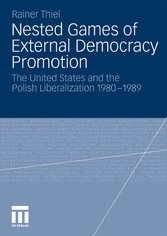Search and Find
Service
More of the content

Nested Games of External Democracy Promotion - The United States and the Polish Liberalization 1980-1989
Acknowledgements
5
Contents
7
List of Figures and Tables
12
List of Abbreviations and Acronyms
13
1 Regime Transitions and External Democracy Promotion
15
1.1 Research Design and Summary of the Argument
16
1.2 The Nested Games Model
19
1.3 Central Contribution
24
1.4 Outline
31
2 The International Dimension of Regime Change
33
2.1 Domestic Causes of Regime Transitions
34
2.2 International Framework
37
2.2.1 The Internationalist Argument
38
2.2.2 Outside Conditions: Diffusion Effects, Contagion and Socialization
41
2.3 External Democracy Promotion
43
2.3.1 Strategies, Instruments and Targets
43
2.3.2 Democracy Promotion versus Democracy Protection
48
2.4 Quantifying International Factors
50
2.5 Democratization and International Relations Theories
52
2.5.1 International Organizations and Domestic Politics
52
2.5.2 Uncertainty and Crises: Deterring Authoritarian Repression
56
3 Strategic Transitions
60
3.1 The Positional School
61
3.1.1 Transition Politics as Rational Choice
61
3.1.2 Formal Theories of Democratization
65
3.1.3 A Question of Life and Death? Uncertainty about Government Repression
71
3.2 Transitions as Distributional Conflict: The Economic School
75
3.3 Rationality and Democratization Actors
77
3.3.1 Why Game Theory?
77
3.3.2 Rationality and its Critiques
80
3.3.3 Limitations
83
4 Nested Games of External Influence on Strategic Regime Transition
87
4.1 Modeling the International Dimension
88
4.1.1 Internal-External Linkages: Scope of Theory and Analysis
88
4.1.2 Constructing Games
92
4.1.3 Basic Assumptions of the Nested Games Approach
96
4.2 Regime, Opposition, and Foreign Power
102
4.2.1 Principal Arena I: Game of Transition
102
4.2.2 Principal Arena II: Outcomes
108
4.2.3 International Arena I: Foreign Pressure Game
113
4.2.4 International Arena II: Outcomes
118
4.3 Nested Games of Transition and Foreign Pressure
126
4.3.1 Formalization
126
4.3.2 Discussion and Interpretation
134
4.4 The Model’s Implications and Generating of Hypotheses
142
4.4.1 Preference Change of the Regime
143
4.4.2 Weighing the Games
145
4.4.3 Temporal Dimension
149
4.4.4 Impact on the Opposition and the Democracy Promotion Dilemma
150
4.4.5 Summary
154
5 Methodology
157
5.1 Empirical Research Design
157
5.2 Case Selection
163
5.3 Data Basis
168
5.4 Structure of the Empirical Part
172
6 U.S. Democracy Assistance in the Polish Liberalization Process, 1980-1989
175
6.1 The United States Policy Toward Poland
176
6.2 Poland’s Path to the Round Table Negotiations
181
6.2.1 The Birth of Solidarity, Strikes, and Martial Law, 1980-1981
181
6.2.2 Underground and Ostensible Stability, 1982-1988
183
6.2.3 Induction and Negotiations of the Round Table, 1988-1989
188
6.3 Supporting Solidarity
190
6.3.1 Sustaining the Underground
191
6.3.2 Communications and Propaganda
195
6.3.3 The Logistics of External Influence
198
6.3.4 Advice and Influence on Opposition Strategy
202
6.3.5 How to Elect Jaruzelski without Voting for him?
208
6.4 Pressuring the Jaruzelski Regime
212
6.4.1 Sanctions as Policy Instrument
212
6.4.2 The Post-Martial Law Sanctions Regime
215
6.5 Sub-Actors and Mechanisms of Democracy Promotion in Poland
218
6.5.1 National Endowment for Democracy
218
6.5.2 Waging Underground Political Warfare: The CIA
223
6.5.3 A Foreign Service of Its Own: The AFL-CIO
226
6.5.4 Department of State and USIA
229
7 Correspondence between Theory and Facts
232
7.1 Effect on Communist Regime
232
7.2 Effect on Solidarity
237
7.2.1 Professionalizing the Underground
238
7.2.2 Underground Press
239
7.2.3 Morale Boosting
241
7.3 Costs of Repression
245
7.3.1 Impact of Opposition Assistance on the Regime’s Cost Structure
245
7.3.2 Timeline: Nested Costs of Authoritarianism
248
7.4 Strategy Shifts and Trajectories of External Influence
250
7.4.1 Repression 1981
252
7.4.2 Opening 1986
252
7.4.3 Negotiations 1988/1989
255
7.4.4 The Juncture of Jaruzelski’s Election to President in 1989
257
8 Conclusion
259
8.1 Democracy Promotion as Nested Games
260
8.2 Key Implications for External Democracy Promotion
265
8.3 Future Research
269
Bibliography
275
Appendix 1: Derivations Repeated Play of Non-nested Games
304
Appendix 2: Derivations of Nested Game with Varying Frequencies
307
Appendix 3: List of Interviews
309
All prices incl. VAT












